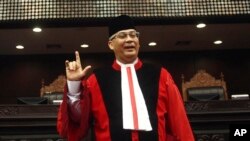JAKARTA —
In a country beleaguered by weekly graft scandals, Indonesia’s Constitutional Court is known as one of the country’s cleanest institutions. That is why the arrest of Constitutional Court chief Akil Mochtar in a sting operation has been met with shock in the capital Jakarta.
The Constitutional Court chief was arrested Wednesday night, together with a politician, local regent and two businessmen.
Investigators said they arrested the high-profile judge on bribery charges and also seized $261,000 in cash from his house as evidence.
The funds are believed to be bribe money paid to the judge in return for a favorable ruling in a lawsuit on a regional election, currently being tried at the court.
Analysts say the arrest is a blow for the Indonesian judiciary, and reveals just how high up the problem of corruption runs.
“According to the various surveys, by say, Transparency International, they put the Indonesian judiciary as the most corrupt. The most corrupt institutions are the parliament and then the judiciary, politicians and judges, so this is the reality we have in the Indonesian judiciary," said Danang Widoyoko, with Indonesia Corruption Watch. "And this is not a new phenomenon."
Despite the corruption in the judiciary, the Constitutional Court is seen as one of the cleanest institutions, in part because it is relatively new.
The court was established in 2003 and in its early days established a new culture of transparency.
But Widoyoko says it was only a matter of time for judges, chosen from the legislative, executive and judicial branches, would sully the new court.
Indonesia’s President Susilo Bambang Yudhoyono, who rarely comments on corruption cases, weighed in Thursday expressing his shock and disappointment.
Judicial corruption, he said, could undermine the nation’s democratic system.
Mochtar was arrested by the KPK, Indonesia’s Corruption Eradication Commission.
The anti-corruption body has become a formidable force in a country riddled with corruption, this year rattling the Indonesian parliament with a swathe of high profile arrests of politicians.
Since it was first established in 2003, the KPK has had a 100 percent conviction rate.
Given his probable conviction, Mochtar has been urged to immediately step down from his position.
The ICW’s Danang Widoyoko said that even though the arrest is a blow to the Indonesian judiciary, and the Constitutional Court, also known as MK, it’s also a big win for the anti-corruption body.
“Now of course, catching the chief of the Constitutional Court, it can be considered as progress for the KPK. But for the judiciary institution it is decreasing because MK is considered as a good institution. Now even the chief of the MK can be arrested in a corruption case,” he said.
Anti-graft group Transparency International ranks Indonesia 118 out of 176 countries in terms of its comparative rates of corruption.
The Constitutional Court chief was arrested Wednesday night, together with a politician, local regent and two businessmen.
Investigators said they arrested the high-profile judge on bribery charges and also seized $261,000 in cash from his house as evidence.
The funds are believed to be bribe money paid to the judge in return for a favorable ruling in a lawsuit on a regional election, currently being tried at the court.
Analysts say the arrest is a blow for the Indonesian judiciary, and reveals just how high up the problem of corruption runs.
“According to the various surveys, by say, Transparency International, they put the Indonesian judiciary as the most corrupt. The most corrupt institutions are the parliament and then the judiciary, politicians and judges, so this is the reality we have in the Indonesian judiciary," said Danang Widoyoko, with Indonesia Corruption Watch. "And this is not a new phenomenon."
Despite the corruption in the judiciary, the Constitutional Court is seen as one of the cleanest institutions, in part because it is relatively new.
The court was established in 2003 and in its early days established a new culture of transparency.
But Widoyoko says it was only a matter of time for judges, chosen from the legislative, executive and judicial branches, would sully the new court.
Indonesia’s President Susilo Bambang Yudhoyono, who rarely comments on corruption cases, weighed in Thursday expressing his shock and disappointment.
Judicial corruption, he said, could undermine the nation’s democratic system.
Mochtar was arrested by the KPK, Indonesia’s Corruption Eradication Commission.
The anti-corruption body has become a formidable force in a country riddled with corruption, this year rattling the Indonesian parliament with a swathe of high profile arrests of politicians.
Since it was first established in 2003, the KPK has had a 100 percent conviction rate.
Given his probable conviction, Mochtar has been urged to immediately step down from his position.
The ICW’s Danang Widoyoko said that even though the arrest is a blow to the Indonesian judiciary, and the Constitutional Court, also known as MK, it’s also a big win for the anti-corruption body.
“Now of course, catching the chief of the Constitutional Court, it can be considered as progress for the KPK. But for the judiciary institution it is decreasing because MK is considered as a good institution. Now even the chief of the MK can be arrested in a corruption case,” he said.
Anti-graft group Transparency International ranks Indonesia 118 out of 176 countries in terms of its comparative rates of corruption.








